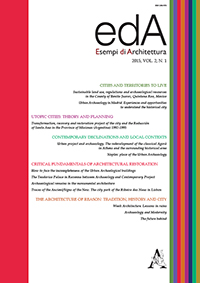Estratto da
ESEMPI DI ARCHITETTURA
International Journal of Architecture and Engineering
Traces of the Ancient/Signs of the new. The city park of the Ribeira das Naus in Lisbon
ESEMPI DI ARCHITETTURA
International Journal of Architecture and Engineering
Traces of the Ancient/Signs of the new. The city park of the Ribeira das Naus in Lisbon

The theme concerning the established relationship between ancient surviving traces and new design symbols cuts across the entire history of architecture and has for centuries counterpoised, on both theoretical and cultural levels, the specific disciplines of restoration and planning. Traces of the Ancient /Signs of the New does not aim to repeat in an exclusive manner the dialectic of opposites that have animated the eternal conflict between conservation and innovation. Rather it suggests a comparison inspired by a thesis identifying in any modification an active relationship of continuity with the past as a result of an ongoing process. In the contemporary design practice in Portugal we can see how the concepts of place, inclusion and contextual analysis do not represent the foundations of generalized environmentalist guaranties but, on the contrary, matched to the modification purpose, are a measure of the comparison between new and existent where the differences become a value for the project as in the recent requalification of the city park of the Ribeira das Naus in Lisbon. The theme of the relationship of contemporary architecture with pre-existing architecture finds an appropriate operative dimension when, reaching beyond the sphere of ideology and that of the opposite reasons of memory and development, it directs design positively towards at times differentiation and at times empathy, according to the particular circumstances, yet always creating a strong tension between the reasons of the existing and the needs of new. Intervening in archaeological spaces means to re-design the way we relate to the past, renegotiating identities and values according to our present. From this point of view, heritage is not only memory or history, but it becomes a phoenix-like desire, an evolutionary principle, an incessant rebirth and a great opportunity to mediate between traces of the ancient and symbols of the new.
| pagine: | 109-120 |
| DOI: | 10.4399/978885488586810 |
| data pubblicazione: | Luglio 2015 |
| editore: | Aracne |








